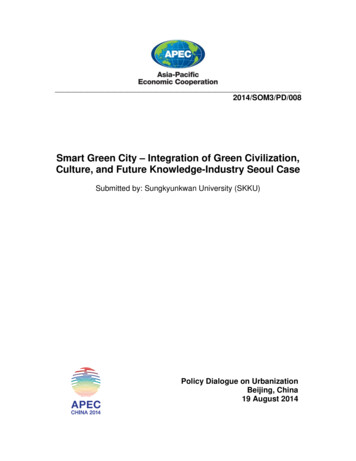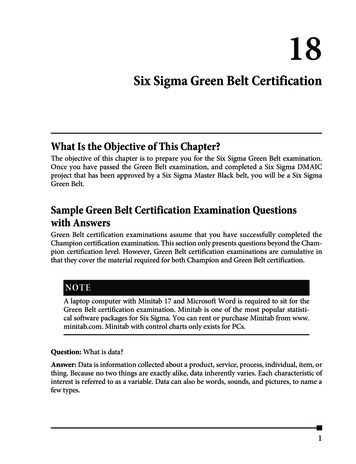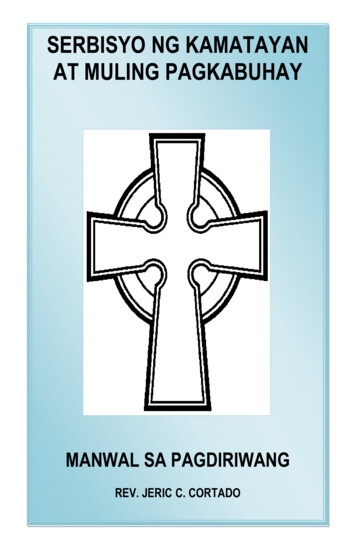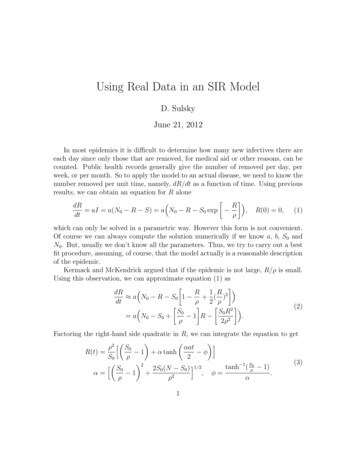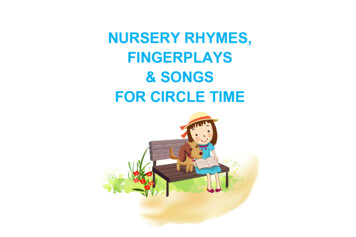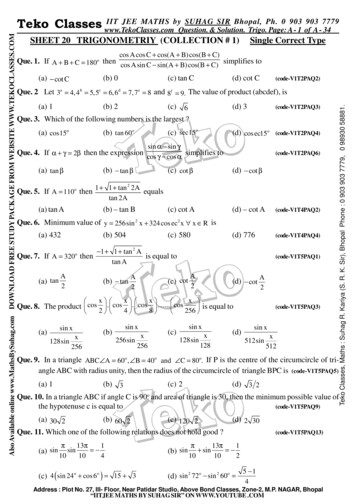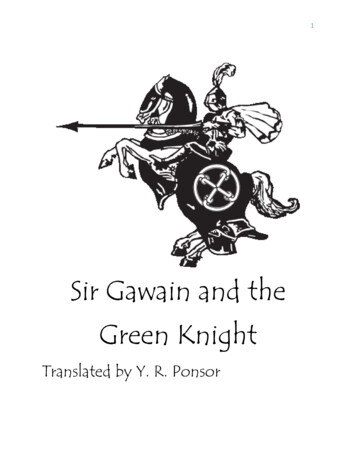
Transcription
1Sir Gawain and theGreen KnightTranslated by Y. R. Ponsor
2Sir Gawain and the Green KnightSir Gawain and the Green Knight is a medieval romance. This genre of literature featuresadventuring knights, noble ladies, and often, elements of the supernatural. More importantly, the herousually undergoes a process of self-discovery in the course of his adventure, which enables him toreincorporate into society (represented by the courts) as a better version of himself.Sir Gawain and the Green Knight, believed by some scholars to be the work of the so-calledPearl Poet, first appeared about 1370. In its original Middle English form Sir Gawain is a poem of morethan 2500 lines, which are divided into 101 stanzas grouped into four major sections. The alliterativeverse is similar to that of Beowulf, reflecting the revival of interest in native English poetry that tookplace in the 14th century.Sir Gawain and the Green Knight is a medieval romance. This genre of literature features adventuringknights, noble ladies, and often, elements of the supernatural. More importantly, the hero usuallyundergoes a process of self-discovery in the course of his adventure, which enables him to reincorporateinto society (represented by the courts) as a better version of himself.Sir Gawain is a narrative rich in the Arthurian legend and the chivalric code. The coderepresented a fusion of Christian and military ideals as a basis for gentlemanly conduct. The chiefchivalric virtues were piety (love of God), bravery, loyalty, and honor. The most important of thesetraits was probably loyalty. The chivalrous knight was loyal to God, to his master, and to the mistress ofhis heart. Besides the battlefield, the tournament was the chief arena in which knights demonstratedthe virtues of chivalry.Sometimes Sir Lancelot is considered to be the perfect knight; however, in the early Arthuriantradition that role belonged to Sir Gawain. He was the greatest of the Knights of the Round Table,famous for his physical prowess, courtesy, and integrity. His encounter with the Green Knight forceshim to acknowledge his human weakness and his failure to live up to the knightly ideal.This is a prose retelling of a poem written at the same time as Chaucer’s poems but in a verydifferent dialect, that was used in provincial England 150 mile northwest of London, where themanuscript was found. Along with the manuscript there were three religious poems titled “Purity,”“Patience,” and “Pearl.” Because these poems were all found together, the unknown author is oftencalled the Pearl Poet. The source of the narrative is unknown. Some believe that a lost French poemprovided inspiration; other scholars find the story of the beheading much like ancient folklore that mightderive from local Welsh sources. Whoever the author, whatever the sources, the poem is one ofsubtlety and sophistication.This work is entirely Christian in its moral because Gawain finds himself in a situation where hisknightly prowess is useless to him, making him realize that only God’s grace has real value. HoweverChristian its message, the narrative is pagan, depending upon a belief in the magic of Merlin and Morganle Fey.
3From Sir Gawain and the Green KnightWinter lay upon the land. Cold held forest andfields in its grim clutch, and in the night skystars glittered like gems. The wolf slid fromshadow to shadow stalking hapless prey, fallingupon the unwary with death in his fangs. Deepin caverns the great trolls and other monstersmumbled in uneasy sleep, seeking warmth.Over the moor and fen the mists rose and fell,and strange sounds troubled the chill silence.But on the hill, lights gleamed in thecastle. In the court of Camelot were gatheredall the brothers-in-arms of the table Round andtheir highborn ladies to celebrate the Christmasseason. A full fifteen days it was then, a time ofmerriment and mirth and rich revel. Laughterrang loud through the halls, and all the musicand delight that the mind of man might devise.With merrymaking and glee the companywelcomed the New Year, exchanging gifts andcalling out glad Noel.On this New Year’s day, fresh and crispcold, twice the number of celebrants crowdedthe great hall; and the most noble, the fairest,and most famous was Arthur himself, the mosthonorable man who ever ruled a court of led anarmy into battle. This king was a man of thegreatest good will and generosity of soul, and itwould be difficult to imagine a bolder companythan that one gathered in the castle on the hill.Among the group on the high daisfacing the great hall lined with tables of nobleknights was Guenevere, Arthur’s wife, thecomeliest maid, the gracious lady of thegleaming gray eyes. Her silken garmentssparkled with rich jewels, and her golden hairshone as softly as her eyes. With her sat theyoung Gawain, with Agravaine the Stronghandon the other side; both were the king’snephews and worth knights who had provedtheir prowess many times in test and trial. Atthe head of the table sat the chief of all bishopsin Cornwall, the saintly Bedwin, and with him,Urien’s son Iwain.But Arthur, full of his own happinessand childlike in his joy, would not sit until allwere served. For most of all he loved life, itsjoys and its adventures, and his eager brain andyoung blood would not allow him to lie abed orsit around lazily. And besides, he had takenupon himself a vow that on this special day ofall days, he would not eat until a rare tale ofancestors and arms and high adventure weretold, or some grand challenge of knights to joinin jeopardy, jousting life for life as fortunemight favor. So he stood before the high table,speaking of trifles and laughing at the noise andfine festival of his free men as the first coursewas announced with the crackling of trumpets,with drums and tuneful pipers. In the corner abard awakened the lute and many a heart liftedwith a touch upon the strings. Then came theplatters piled high with fine food, venison, andother meats, and great bowls of soup, andplenty of strong beer and fine red wine. Alldrank and ate as much as they wanted.Hardly had the first course beenfinished when the great hall door crashed openand in rode a terrifying knight. He must havebeen the hugest man on earth, so broad andthick from neck to waist, so long of leg andstrong of arm that I half thought him a giant,except for his fine features of a face. Everyoneknows that giants are hideous to look upon,besides being fearful in size. At sight of him, allin the hall fell silent, struck dumb by thisapparition. For this bold man, from toe to top,in clothes and in countenance, was brightgreen.Believe me: all garbed in green, thisman, and all his trappings. He wore a tight coatwith a heavy mantle adorned with ermine, thesame fur lining the hood that had fallen fromhis head and lay on his shoulders. Green were
4the stockings on his legs, and decorated withgold embroidery, and bright golden spurs on hisfeet, and shoes with upturned toes. His beltwas set with gleaming jewels, all emerald green,and indeed they were scattered over all hisarray and that of his horse, the saddle andbridle and reins, all gaudy in gold and green.The trappings of the horse, the breast-cloth andbits and bridle, even the stirrups in which hestood, all were enameled and gleamedgoldenly, and the green gems glittered like theeyes of a cat. The steed itself which hestraddled was a great heavy horse, hard to hold,hard to hold; and it was the same green as theman who rode it.Gloriously was this man outfitted ingreen, and the hair of his head as green as hishorse. It fanned out full and fell to hisshoulders, and he had a heavy beard whichreached his chest. It gleamed upon the leathertunic. Such a pair had never before been seenon this earth, nor since that time! Everyonesaid he looked as bright as a flash of lightening,and, indeed, who could withstand his stroke!He wore neither helm nor hauberk—no, no coatof mail did he wear, nor want!—and he carriedno weapons, neither spear nor shield to smiteor to save. But in his hand he carried a boughof holly. That branch which is the greenestwhen all others are bare; and in is other hand,an ax, heavy and horrid, a cruel weapon rightout of a nightmare. The head measured at leastan arm’s length, and was of green steel workedwith gold, the bit burnished bright, the broadedge honed to shear as closely as a sharp razor.The steel of the haft which he held in his handwas wrapped with iron wire to its very end,graven with green in delicate design. A thongbound it about and fastened at the head whereit was tasseled and braided with bright green.This knight moved through the greathall’s silent crowd right up to the front hightable, and he feared no danger, greeted no one,but looked straight ahead. Then he reined inhis horse and faced the room. He stared boldlyat the knights, looking them up and down, andhis voice thundered when he spoke.“Where is the leader of this company? Iwould like to see him and speak I courtesy withhim, as the rules of chivalry require.”He waited and looked at them andconsidered who might among this company bemost renowned.Everyone stared at him in wonder,marveling as to what his appearance mightmean, how such a knight and such a horsemight be such a strange color, green as growinggrass, and glowing with enamel and gold.Everyone studied him as he sat there on hishorse, and they walked cautiously around himwith all the wonder in the world as to what hemight do. Many strange things had they seen,but never any such as this. Possibly a phantom,or some fey creature, they deemed him to be,for green is a magic color. But all of these braveknights feared to question him and, stunned athis voice were dumbstruck. A heavy silencefilled the royal chamber and all those who hadbeen chattering sat as if caught in a dream—some, I suppose out of politeness, some fear,but let another man decide which!Then Arthur standing before the dais,greeted him, and bowed courteously, for hewas never rude, and said, “Fair knight, welcometo this place. I am Arthur, the chief of thiscompany. Alight and rest, I beg you, andwhatsoever your will may be, we shall be gladto learn.”“No, God is my witness that to wastetime in idle talk is not my errand,” replied theknight. “But your fame, lord, is raised high, andthrough town and countryside you are regardedas the best and bravest every to ride in battlegear, the noblest and finest of the world’s kind.You are all known to be valiant in dealing withall sorts of adventures and your hall is known
5for courtliness. Many tales of this companyhave reached my ears and that is what hasbrought me hither at this special time.”“You may see by this branch which Ibear here that I have come in peace, seeking notrouble; for had I fared forth in a frame of mindto fight, I would have brought helm andhauberk, and shield and bright-shining spearand other weapons to wield also. But because Iseek no strife, I am dressed as you see. But ifyou are as brave as everyone says, you willgladly grant me the game that I ask as a guest’sright.”And Arthur answered, “Gentle knight, ifyou crave combat, you will not fail to find ithere.”“No, I seek no contest, as I have toldyou, especially since I see on these benchesonly beardless children! If I were geared up forfighting and mounted on my high steed, there isno man here who could match me.” And helooked upon them with scorn. “I seek in thiscourt only a Christmas game, for it is Yule andthe New Year, and the time to exchange gifts. Ifthere should be any in this hall who considershimself brave enough of wit that he would dareexchange stroke for stroke with me, let himcome forth. I will give him as my gift this fineheavy axe—heavy enough it is to do his will!—and I shall take the first blow as bare as here Isit. If any of these fine warriors may be so boldas to accept my challenge, let him step forthand seize this weapon. I quit-claim it forever,and he may keep it as his own, and I shall kneelbefore him and stand a stroke. And then youwill grant me the right to deal him an equalblow, though I will give him respite of a yearand a day. Now let any man who so daresspeak quickly.”Chapter 2If the people had been astonished at first, nowthey all, high and low throughout the hall, sat asif turned to stone. The knight on his steedtwisted in the saddle, his red eyes flashingaround the room, his green hair flying with eachmovement of his head. Then he sat still, staringat them and stroking his beard as the silencelengthened. When no one spoke, he stood upon his stirrups and, shaking his fist above hishead, he shouted at them.“What is this? Is this Arthur’s court, ofwhich the whole world sings praises? Wherenow is your pride? Where is your fightingspirit? Where now your fierceness and fameand all you fine words? Now is the reputationof the Round Table overthrown by the words ofone man, without a single blow being struck,because you are afraid to answer?”Then the blood shot for shame intoArthur’s face, and he turned as angry as a stormwind, as indeed did all of them. Men mutteredand surged forward in anger, half-rising fromtheir places, white with wrath. But Arthur heldup his hand and sprang to face the green man.“Sir, by heaven! Seek no further! Asyou in your own folly have asked, so shall it be!No man here is afraid of your boasts. Give meyour ax, and with God’s help, I shall break everybone in your body. I myself will meet yourterms.”The Green Knight laughed aloud andleaped lightly from his horse and landed beforeArthur, taller by head and shoulders than anyman in court. The king seized the ax andgripped the handle tightly and waved it about,striking this way and that to test its feel. Theknight calmly removed his mantle and then hisshort coat, no more than if some man hadbrought him a glass of wine. The Gawain, whosat by the queen, called out, “I beseech you,uncle, to grant me a kindness. Let this contestbe mine. Gentle Lord, give me permission toleave this table and stand in your place there. IfI may without discourtesy—if my liege lady willnot take it amiss—I would presume to counselyou before your royal court.” He stood up and
6spoke clearly. “I think it is not seemly that sucha challenge should be raised in this highchamber, much less that you yourself should sovaliantly choose to answer it while so manybrave warriors remain on these benches. Nobetter men can be found on any field of barrel,nor any more skillful in arms. All men knowthat I am the least brave, and the feeblest ofwit, and the least deserving to be of thiscompany. In truth, it is only because I am yournephew that I am worthy at all; I know nobounty but your blood in my body. And sincethis business is so foolish and trivial, none of itshould concern you at all.“So I ask: Let it come to me, and if I failin its performance, then the fault is in me andno blame shall fall on this court.”Arthur moved from table to tableconsulting with his nobles, as is the custom insuch cases, and all agreed that the king shouldretire from the contest and give Gawain thegame.Gawain turned and bowed to the grayeyed Guenevere, and she smiled on him, and hecame down from the dais and, kneeling beforehis king, he received the ax from Arthur’s hands.And Arthur smiled affectionately upon him andraised his hand and asked God’s blessing,praying that both Gawain’s heart and his handshould be strong.“Be careful, nephew,” he said softly,“and set yourself for the stroke. If you direct itproperly, I am sure that you will be able to bearthe burden of the blow which he will laterinflict.” And Arthur removed himself and wentand leaned against the edge of the dais andwatched eagerly.Gawain walked, ax in hand, to theGreen Knight, who had been waiting patiently.He looked upon Gawain, and he said, “Now, letus reaffirm our bargain before we go on. Butfirst I would ask you, sir, what is your name?”“I am Gawain,” the young man said. “Itis Gawain who gives you this blow, whatevermay happen afterwards. One year from nowyou may return the favor with whateverweapon you wish, asking leave of no one else.”“By God,” shouted the other, “it pleasesme greatly that I should receive this blow fromyour hands. You have rightly repeated thecovenant which I made with your king—exceptthat you must seek me, friend, wheresoeveryou think I may be found, pledging to comealone, and return to me such wages as you dealto me today before this court.”“And where shall I look for you? Whereis your home? I know neither your kingdom noryour name, kith nor kin. Tell me your realm andname and I shall certainly find you. That I swearon my honor.”“No,” said the green man, “nothingmore is necessary now. But I promise thatwhen I have taken your blow, if you strikesquarely, then I will tell you how to find me sothat you may fulfill our bargain.” Then helaughed. “If I do not speak, then so much thebetter for you; you can stay in your own landand light no wayfarer’s fires. But enough! Takeup your weapon and let us see how you handlean ax!”“Sir,” said Gawain, “I will,” and hestroked the edge of the ax.The Green Knight knelt on the floor andbent his head and his hair over the crown of hishead. His bare neck shone whitely. Gawain sethimself, left foot forward on the floor. Hegrasped the ax and lifted it aloft, and hebrought it down like a lightning bolt upon thebare flesh and sundered the bones and shearedit in half, and the steel blade buried itself in thefloor with a great ringing crash.The fair head flew from the shouldersand rolled about near the tables, and some ofthe knights kicked at it with their feet, a grim,grisly game. Blood burst from the body, red
7gleaming on green. The knight did not falter orfall, but at once he sprang up on his strong legsand jumped into the crowd and snatched up hishead by the hair and lifted it high for all to see.Then, striding to his horse, he caught up thereins, stepped into the stirrups sat aloft, stillholding his head high in one hand.And they say that he sat in his saddle asthough nothing whatever ailed him, headlessthough he was. He twisted from side to side,turning that hideous, still bleeding body in thesaddle. Those who watched in fear were evenmore horrified to see that he was about tospeak.He turned the grim face toward thehigh table, and the head lifted up its eyelids andlooked at them. Then it looked at Gawain andthe mouth moved and the lips spoke.“Look to it, Gawain, that you do as youhave sworn, and seek faithfully until you findme. All men know me as the Knight of theGreen Chapel. To the Green Chapel you mustcome, I charge you, to receive such a blow asyou have dealt here to me today. You will findme if you try. If you fail to come, coward shallyou be called by the whole world.”With a quick movement he pulled hishorse around and fled through the great door,still head-in-hand, and the fire form the hoovesof his flint shod steed flashed through the hall.What native land he would return to, nonethere knew, any more than they knew fromwhence he had come. In a moment a roar ofastonishment filled the hall, and Arthur andGawain burst into laughter at the strange event.All agreed that it had been a marvel amongmen.Although Arthur, ever the wise king,had a great uneasiness in his heart, he did notlet a hint of it be seen, but he spoke to hisqueen with courtly speech.“Dearest lady, let not today dismay you.Often such a magic and wondrous event occursat this season, along with the music of minstrelsand the laughter of lovely ladies and braveknights.”And he touched her hand gently andgazed into her eyes. Then he sat back, lookedaround the room, and cried out, “Now at last Imay address myself to dinner, for I havecertainly seen a marvel, I must admit.”He smiled at Gawain with love shiningon his face, and he said, “Hang up your ax,nephew, it has done its work for today.” And itwas placed on the wall above the high tablewhere all might admire and wonder at the sightand the strange adventure. Then they sat downagain at the tables, each to his place, king andknights, and the servants brought doubleportions of all the best dishes and with allmanner of good will they passed the rest of theevening.But be sure, Sir Gawain, that fear doesnot cause you to fail in this test, this challengewhich you yourself have taken into your ownhands!Summary of Chs. 2-10[After a year has passed and true to hisword, Gawain sets out to find the Knight of theGreen Chapel. Near Christmas he stops at acastle that is near the area of the Green Chapel.The friendly lord of the castle offers himhospitality and an opportunity to rest before hisencounter with the Green Knight.Each day the lord goes hunting, leavinghis wife alone with Gawain. On the very firstday, the wife of the lord approaches Gawainromantically, intent on seducing the youngknight. Prior to the lord’s hunting departure,the men agreed to exchange what each has wonduring the day, and so, at the end of the firstday, the lord gives Gawain a deer, and Gawainmust give the lord a kiss. The second night thelord gives Gawain a boar’s head; Gawain giveshim two kisses. On the third day, while herhusband is out hunting, the lady again tries to
8seduce Gawain and gives him a magical greensilk scarf that will protect him. When thecastle’s lord returns from his day of hunting, hegives Gawain a fox. Gawain gives the lord threekisses but not the magical green silk scarf thatthe lady has given him. This is a violation of thecode of chivalry, which requires that knight keepfaith, or be true to his word. He wears thegreen sash as he rides out from the castle to hisrendezvous with the knight of the Green Chapel.At a bubbling brook Gawain hearssomeone sharpening a scythe; the person turnsout to be the Green Knight. Gawain offershimself to the knight who moves as if to delivera fatal blow to Gawain’s neck. Gawain flinchesslightly, and the Green Knight reproaches himfor his cowardice.Gawain asks for a second chance.Again the Green Knight brings down his ax butstops before the blade hits Gawain. This timeGawain does not flinch. The Green Knight thentells Gawain to bare his throat. Gawaincomplies, and the Green Knight nicks his neck.Gawain leaps up and prepares to defendhimself, as he has now fulfilled the terms of hisagreement.]Chapter 11The Green Knight turned from him and leanedupon his ax, set the shaft to the ground andleaned upon the blade and looked at the ladwho waited there. How steadfast, how fearless,and how bold he looked, how ready for battle!And he was pleased in his heart. He laughedwith a ringing voice and spoke happily with thelad.“Bold knight, upon this field of honor benot so fierce! No man here has used youdishonorably, not treated you discourteously,but only as the decree at Arthur’s courtallowed. I owed you a stroke and you took it, sohold yourself well paid. I release you of anyremnant of all other rights. If I had been morenimble, perhaps I could have wrought you amore harmful blow. First, I merely menacedyou with a pretend blow and cut you with nocruel blade. That was for the agreement wemade on that first night when you faithfullygave me the day’s gains, as an honest manwould. That second pretended blow was forthe second day when you kissed my dear wife,which kisses you gave to me. And for both ofthose I offered you but two scant blows withoutscathe. For an honorable man is true to hisword, and he needs fear no danger.“But on the third day you failed in thathonor, and therefore, you took that tap on theneck.”He looked at Gawain steadily, andGawain at him, still as stone. And the greenman continued.“It is my garment that you wear, thatgreen silken girdle. My own wife offered it toyou, I know. Ah, I know all about those kissesand your character also, and the wooing of mywife! I wrought all this myself. I sent her to testyou. Truly I think that you must be the mostfaultless man that ever walked the earth. As apearl in purity is to white peas, so is Gawain invirtue to all famous knights. But you fell a littleshort there, sir; you failed in faith. But it wasnot for intrigue, not for lawless lust either, butbecause you loved your life, and I cannot blameyou for that.”Gawain still stood like one stunned, soaggrieved with embarrassment that he cried foranguish inside. All the blood of his body burnedin his face, and he shrank for shame as thegreen man talked. He took off his helm andheld it in his hands. Al last he spoke wrathfully.“Cursed be both cowardice andcovetousness! In them is villainy and vice thatdestroys virtue!” And he caught up thepentangle and tore it loose and flung it roughlydown. “Lo!—there is breaking of faith. Foul beits fall! I coveted my life and cowardice led me
9into fault for fear of your blow, made meforsake my nature, the generosity and loyaltythat are a true knight’s” And he bowed hishead and wept bitterly. “Now am I false indeedand from fear have I fallen into treachery anddeceit. Both bring sorrow and shame. I confessto you, sir, here on this spot, that I have indeedbeen false to you in my conduct. If you will, Ishall guard against its happening again.”Then the Green Knight laughed and saidamiably: “I consider it entirely acquitted, anyharm that I had. You have confessed freely andare aware of your failing, and you have stoodsharp penance of my sword. I hold youcleansed of that fault and made as pure as ifyou had never transgressed since your birth.And I give you, sir, as a gift, that very scarf, asgreen as my own robe.” He touched the silk atGawain’s waist lightly, and laid an arm acrosshis shoulders.“Sir Gawain, you may think upon thisparticular contest as you fare forth among thegreat and chivalrous knights of this world. Letthis be the clear token of the adventure of theGreen Chapel.” Then he laughed and saidmerrily, “Now, you shall in this New Year comeback again to my dwelling and we shall revelaway the remainder of this festal time. Withmy wife, I promise, we shall reconcile you, shewho you thought was your keen enemy.”“No,” said Gawain, and he took up hishelm and looked sadly at the green man. “Thishas been a sorrowful journey. Good fortunebetide you and may he who ordains all honorgrant it to you! And commend me to thatgracious lady, both the honored ladies who socunningly beguiled this knight with their tricks.”“It is no great marvel to be made a foolof or to be won to sorrow through the wiles of awoman; for so was Adam, the first manbeguiled; and Solomon by many and variouswomen; and Samson also, Delilah dealt him hiswyrd! David was deluded by Bathsheba andsuffered much woe. All these men werebrought to disaster by woman’s wiles.“It would be a great gain to love themand yet to believe them not. But no man can dothat. For these were noblest men of old, allblessed above other men, and yet they were allbeguiled by women with whom they haddealings. To find myself in that company I thinkmust be excused.” Then he shook off sadthoughts.“But your girdle I will accept with rightgood will, not for the bright gold, nor for itsmagic—“ here Gawain blushed again—“nor forthe silk of fringed sides, nay, not for worth norworship nor noble works. But as a symbol ofmy transgression I shall keep it always with me,a reminder, when I ride in renown, of the faultand frailty of feeble flesh, how susceptible it isto the stains of evil. And when pride of prowessinflates me, the sight of this will humble myheart.“But one request I make, if it does notdisplease you: since you are the Lord of thatland where I stayed with such pleasure thanksto you, will you tell me your name? Only thatand no more?”“That I shall, certainly,” replied thegreen man. “I am called Bercilak de Hautdesertin this land. Through the power of Morgan leFey, who lives in house and has the skill ofmagical lore, all of this has happened. Morgan,the beautiful, the mistress of Merlin—manymen has she taken, for she has had lovedealings with that excellent wizard who knowsall the knights of your court. Morgan thegoddess is also her name. There is none so highin power or pride that she cannot tame!”“She sent me in that manner to yourroyal court in order to test the pride of its men,to see if the reputation of the round table weretrue. She sent me in that strange way to takeaway your wits and to frighten the fair
10Guenevere, to make her die with fear at thesight of that man who spoke with his head in hishand before that Table High. She took the formof that old one in my house, the ancient lady;she is, in fact, your aunt, the half-sister ofArthur, daughter of the Dutchess of Tintagel,that lady upon whom the mighty Uther laterfathered Arthur, who is your king. Therefore, Ientreat you, dear man, to come to your auntand rejoice in my house. My court loves you,and I do as well, indeed, as any man underheaven.”But Gawain still refused. He would notunder any conditions. So they embraced infriendship and saluted each other as fineprinces and parted right there in the cold.Gawain, mounted on his fine horse, hastenedhomeward to Arthur’s court, and the GreenKnight wended wheresoever he would.Gawain rode then through many wildways in the world on Gringolet. He had beengiven back his life, a fine gift indeed, and manya thought he gave to that strange event as hetraveled. Sometimes he harbored in a houseand sometimes out of doors. He had manyadventures in the valley, and he vanquishedmany, but I will not take time to tell all that inthis tale. And thus at last he came to the court,did Gawain the good knight.Happiness sped through those hallswhen it was learned that Gawain had returned.Everyone thought it was a fine thing, indeed,and somewhat unlooked for. The king kissedthe knight and the queen did also, and manyknights sought him out to salute him and makeinquiry of his wayfaring fortune. And he toldthe wondrous tale and confessed everythingthat had happened, the adventure at thechapel, the good will of the green man, the loveof the lady, and the silk that he wore. Heshowed them the scar that he bore on his neck,the sign of his shameful disloyalty to
Besides the battlefield, the tournament was the chief arena in which knights demonstrated . and delight that the mind of man might devise. With merrymaking and glee the company welcomed the New Year, exchanging gifts and . fine festival of his free men as the f
